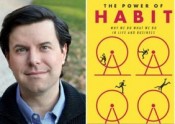Q&A: Rebirth of US Manufacturing – James Fallows, Charles Fishman
Written on January 15th, 2015 |
Aired: 03/31/13
I do my best to question conventional wisdom, but I had heard and repeated the fact that the US had lost its manufacturing and it was never coming back so often that I assumed it must be true. But I pick up the December 2012 issue of the Atlantic magazine recently and two articles jump out at me – both declaring that manufacturing is re-emerging. James Fallows writes of US startups exploiting new technologies to speed up the process of design-to-product, and Charles Fishman writes about US corporations like GE moving production back to the US.
James Fallows’ article, Mr. China Comes to America, opens with these words: “For decades, every trend in manufacturing favored the developing world and worked against the Unites States. But new tools that greatly speed up development from idea to finished product encourage start-up companies to locate here, not in Asia.” That got my attention! Charles Fishman’s article The Insourcing Boom goes even a step further. It’s opening words: “After years of offshore production, General Electric is moving much of its far-flung appliance-manufacturing operations back home. It is not alone.”
I make no bones about the fact that I like to report good news, but I don’t want to make nice or play Pollyanna. This information from these reporters strikes me as the real thing and I’m only too glad to admit I may have prematurely buried “made in America”.
James Fallows www.jamesfallows.com
Charles Fishman www.thebigthirst.com
Q&A: CHARLES DUHIGG – THE POWER OF HABIT
Written on May 16th, 2014 |
Aired 08/26/12
Humans are not alone in being creatures of habit, but can we do anything about it?
Brain science has learned a lot about habits over the last few years. On the one hand, that gives corporations new power with which to manipulate us, but it also gives us greater power over our own behavior.
What is a habit? Are habits positive – a sign of cultivation and industry, or negative, a sign of weakness and mindlessness? Or are they neutral, their value up to us?
Today’s guest, CHARLES DUHIGG an award-winning reporter for the New York Times, has written the best-selling THE POWER OF HABIT: Why We Do What We Do in Life and Business. He tells us that at its most basic level, a habit is a simple neurological loop: a cue (my mouth feels gross), a routine (I should brush my teeth), and a reward (ahhh, minty fresh!). Backing out of the driveway, replying to emails, running before work – many of our most basic daily actions are not, in fact, the products of well considered decision-making, but outgrowths of habits we often don’t even realize exist.
We’ll talk about what a habit is, how they are formed, and how we can put what we’ve learned about habits into practice, so that we are at least somewhat their masters rather than their slaves.
We will also discuss Duhigg’s investigative New York Times series on Apple, including their labor practices and why they don’t manufacture in the U.S.
Q&A: RICK STEINER, Marine conservation specialist Professor, University of Alaska
Written on September 7th, 2010 |
Aired 09/05/10
RICK STEINER served as a marine conservation professor with the University of Alaska from 1980-2010, stationed in the Arctic, Prince William Sound, and Anchorage. He was responsible for the University's conservation and sustainability extension effort, and was producer/host of the Alaska Resource Issues Forum, a public television program on controversial natural resource issues. He advised the emergency response to the Exxon Valdez Oil Spill in 1989 and helped found the Regional Citizens Advisory Councils and the Prince William Sound Science Center. He advises the UN, governments, NGOs, and industry on oil spill prevention, response, assessment, and restoration.
Steiner learned about oil spills the hard way -- in Valdez Harbor. He learned about academic politics the same way, losing federal grant funding for outspoken criticism of the oil industry.
